To Help Move Away From Summary And Toward ANALYSIS, It’s Important To Incorporate Strong Verbs Into

To help move away from summary and toward ANALYSIS, it’s important to incorporate strong verbs into your writing when discussing the writer’s rhetorical choices. Below is a list of verbs that are considered weak (imply summary) and a list of verbs that are considered strong (imply analysis). Strive to use the stronger verbs in your essays to help push yourself away from summary and toward analysis: ex “The writer flatters…” NOT “The writer says…”
Weak Verbs (Summary):
says
explains
relates
states
goes on to say
shows
tells
this quote shows
Strong Verbs (Analysis):
Argues, admonishes, analyzes, compares, contrasts, defines, demonizes, denigrates, describes, dismisses, enumerate, expounds, emphasizes, establishes, flatters, implies, lionizes, lists, minimizes, narrates, praises, processes, qualifies, questions, ridicules, suggests, supports, trivializes, vilifies, warns
Powerful and Meaningful Verbs to Use in an Analysis (Alternatives to Show):
Acknowledge, Address, Analyze, Apply, Argue, Assert, Augment
Broaden
Calculate, Capitalize, Characterize, Claim, Clarify,Compare, Complicate, Confine, Connect, Consider, Construct, Contradict, Correct, Create, Convince, Critique
Declare, Deduce, Defend, Demonstrate, Deny, Describe, Determine, Differentiate, Disagree, Discard, Discover, Discuss, Dismiss, Distinguish, Duplicate
Elaborate, Emphasize, Employ, Enable, Engage, Enhance, Establish, Evaluate, Exacerbate, Examine, Exclude, Exhibit, Expand, Explain, Exploit, Express, Extend
Facilitate, Feature, Forecast, Formulate, Fracture
Generalize, Group, Guide
Hamper, Hypothesize
Identify, Illuminate, Illustrate, Impair, Implement, Implicate, Imply, Improve, Include, Incorporate, Indicate, Induce, Initiate, Inquire, Instigate, Integrate, Interpret, Intervene, Invert, Isolate
Justify
Locate, Loosen
Maintain, Manifest, Manipulate, Measure, Merge, Minimize, Modify, Monitor
Necessitate, Negate, Nullify
Obscure, Observe, Obtain, Offer, Omit, Optimize, Organize, Outline, Overstate
Persist, Point out, Possess, Predict, Present, Probe, Produce, Promote, Propose, Prove, Provide
Qualify, Quantify, Question
Realize, Recommend, Reconstruct, Redefine, Reduce, Refer, Reference, Refine, Reflect, Refute, Regard, Reject, Relate, Rely, Remove, Repair, Report, Represent, Resolve, Retrieve, Reveal, Revise
Separate, Shape, Signify, Simulate, Solve, Specify, Structure, Suggest, Summarize, Support, Suspend, Sustain
Tailor, Terminate, Testify, Theorize, Translate
Undermine, Understand, Unify, Utilize
Validate, Vary, View, Vindicate
Yield
More Posts from Moola-of-hula and Others


“Let us simply say that once there was a place. A place where the universe had... cracked.”
hey if you guys are looking for something to read LET ME RECOMMEND YOU the Shades of Magic series by V.E. Schwab
like this series is freaking amazing.
it has:
amazing writing that is beautiful without being overwrought
a really hecking good plot with magic and adventure and great worldbuilding
NO LOVE TRIANGLES
all the romances feel organic
amazing antiheroes
there’s rotating main characters and they include a badass fucking lady who is disabled (one eye) and a bisexual prince
AND!! the prince’s bisexuality isn’t a Secret or a Big Plot Point it’s just ‘here he is making out with ladies. now dudes’ but it’s also prominent enough that his romances are featured in the books and not mentioned as an afterthought (looking at you, J.K. Rowling)
the series actaully (imo) gets better as it progresses instead of derailing
THE WRITING IS SO GOOD OKAY
Furthermore, it goes without saying that all of the people, living, dead, and otherwise, in this story are fictional or used in a fictional context. Only the gods are real.
American Gods, Neil Gaiman
Day 14: Favorite book of your favorite writer
(via thewizardofgays)

Raven Queen

Weird Circus by Sergii Golotovskiy
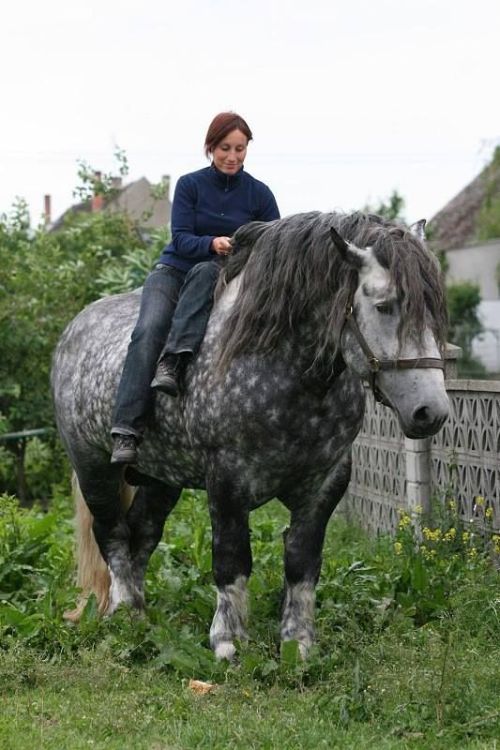
I never made a post about draft horses. :T They are the gentle giants of the horse world, sometimes growing as large as 20 hands and over 2000 lbs. The tallest horse in the world is an American-type Belgian horse named Big Jake (I think???).
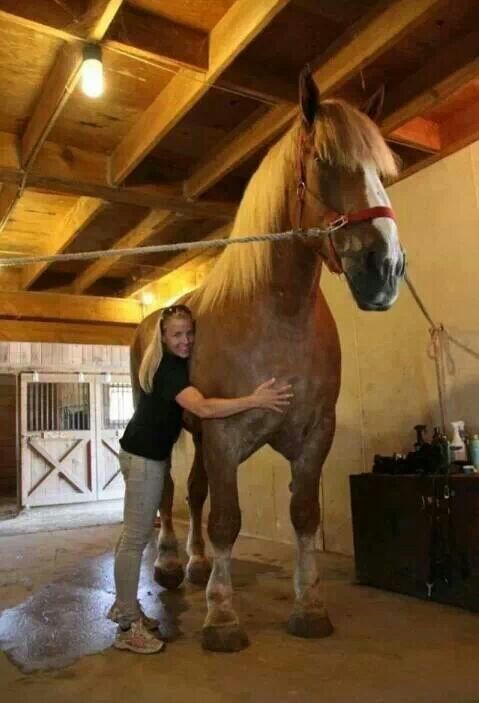
A very big (but good) boy!
Despite their size, draft horses are known for their quiet, even temperaments, which make them good work horses. They were originally bred to pull wagons and plows, and they still do that. The most famous draft horses are probably the Budweiser Clydesdales, i.e. the horses in those Superbowl commercials that make us cry every goddamn year.

Draft horses can be ridden, and they are often crossed with lighter breeds, such as Thoroughbreds and Quarter Horses, to create tall, sturdy-boned, quiet sport horses.

Such horses were a common sight during foxhunts, as “hotter” breeds, like Arabians and Thoroughbreds, tend to lose their minds a bit in the chaos of the hunt. Draft horses can also be crossed with Mammoth Jack donkeys to create draft mules, which are also used to pull plows for the Amish.
Mammoth Jack donkey:

Draft Mule:
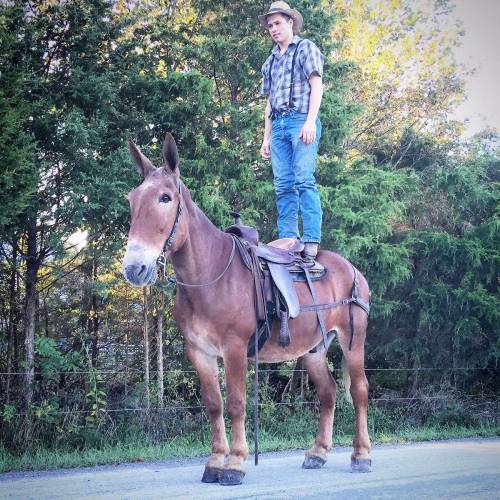
There are a lot of draft breeds, some more common than others. Many of the common ones are easy to tell apart from the others, but they’re all large-boned and tall, except for the draft ponies, such as Halflingers and Norwegian Fjord horses.
The Belgian
There are two Belgian horses, one that’s popular in Europe and another that’s very common in the US.
This is the European-type “Brabant” Belgian, which tends to be very thick boned and roan in color.
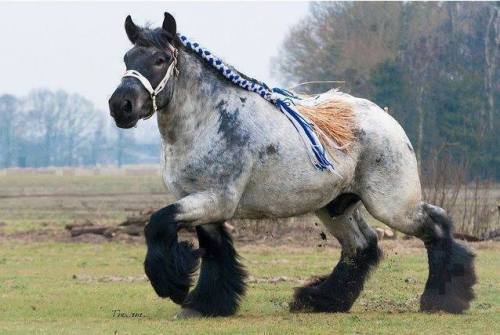
This is the American-type Belgian, which is lighter-boned and always sorrel/palomino in color:
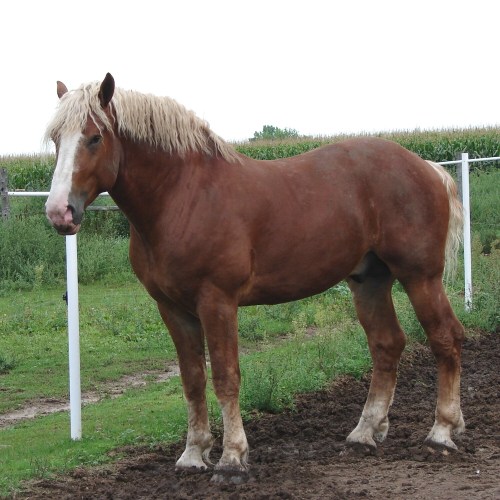
Here is a Brabant Belgian mare pulling some shit:
A lot of draft horses really do enjoy pulling stuff, as much as a horse CAN enjoy doing anything that’s not eating grass and farting. Horse pulls are a common sight in Middle America, often done using Belgian horses. Here’s one of a team pulling 9200 lbs. They pull for a very short period of time, often only a few seconds.
Next up is the Percheron, which has a similar body type to the Belgians but are always black or dapple. They can be slightly more spirited than Belgian horses, with some demonstrating high stepping action.
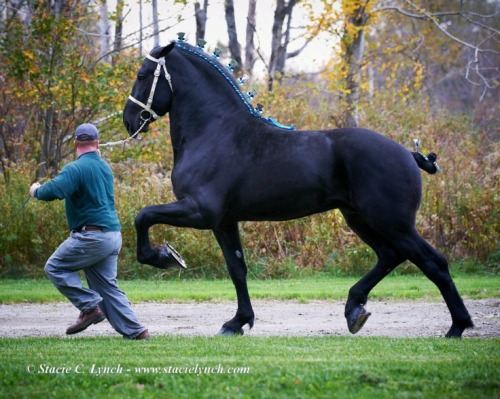
They are not to be confused with Friesians, who have much more “feathered” legs and feet (long hair around the lower legs) and are lighter-boned. Friesians also don’t come in dapple colors, like the horse at the top of this post.
Clydesdales
Clydesdales are recognizable because they are a) always bay colored and b) almost always have four white socks and a blaze on their faces. They also have much more feathering on their legs than Percherons or Belgians. Clydesdales are more common in parades and the like because they tend to be slightly lighter than Percheron and Belgians, and because of this, they’re more agile and “showy”. You probably would not want to plow with a Clydesdale. You could, but their feathering means their feet get dirty much easier than a Belgians might.
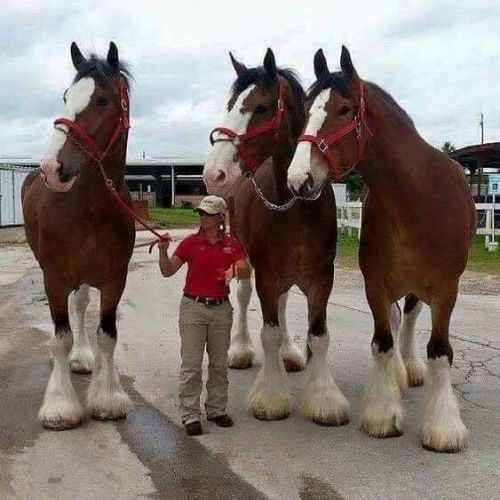
Shire Horse
Shires come in a variety of colors, usually black or bay, and they are probably the most “feathered” horses of the popular breeds. They’ve got lots of fur on their feet.

Gypsy Vanner Horses
Gypsy Vanner horses got their start pulling Roma wagons, but now they’re mostly used in fantasy photoshoots, and you can see why. They are beautiful horses, definitely not the type you’d want toiling in the muck. They are almost always paint colored, which distinguishes them from Shire horses.

These are the main, most popular and commonly seen full-sized draft breeds, at least in the US. However, there are also draft ponies, the most popular of which is the Halflinger, which resembles a shrunken Belgian horse. They are ALWAYS sorrel/palomino colored, but their frame can vary. Some Halflingers are lighter-boned and more suitable for riding. Others are thicker-boned and better for pulling.
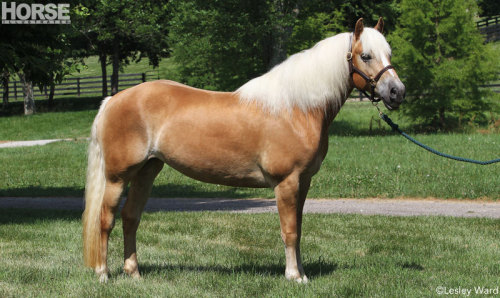
The other unmistakable draft pony is the Norwegian Fjord, easily recognized by the black stripe in the center of its mane, like a reverse ice cream sandwich.

This can lead to some creative hair cuts
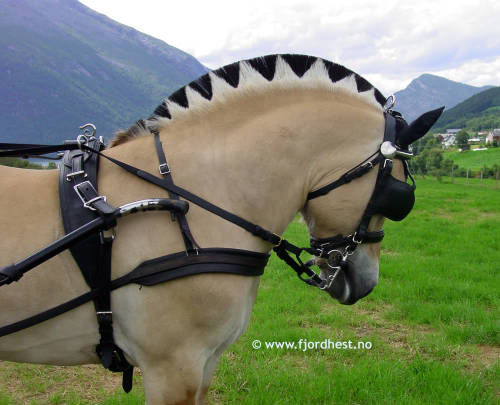
So there you go. That’s a somewhat comprehensive review of draft horse breeds. Here is a size comparison for funsies, with the average riding horse in the middle.
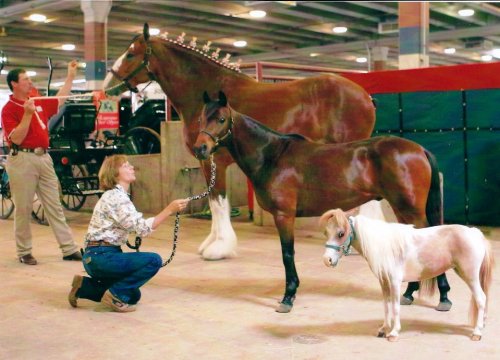
Attelage Mécanique
-
 simsimousse liked this · 1 month ago
simsimousse liked this · 1 month ago -
 roselyn-writing reblogged this · 2 months ago
roselyn-writing reblogged this · 2 months ago -
 roselyn-writing liked this · 2 months ago
roselyn-writing liked this · 2 months ago -
 hellyrigs liked this · 4 months ago
hellyrigs liked this · 4 months ago -
 anna5m4wj liked this · 6 months ago
anna5m4wj liked this · 6 months ago -
 numberonekoalacreation liked this · 7 months ago
numberonekoalacreation liked this · 7 months ago -
 animeschibia reblogged this · 8 months ago
animeschibia reblogged this · 8 months ago -
 highcalibernao liked this · 9 months ago
highcalibernao liked this · 9 months ago -
 lisadelise reblogged this · 9 months ago
lisadelise reblogged this · 9 months ago -
 deadchique liked this · 9 months ago
deadchique liked this · 9 months ago -
 cocoagadgetsworld reblogged this · 9 months ago
cocoagadgetsworld reblogged this · 9 months ago -
 cocoagadgetsworld liked this · 9 months ago
cocoagadgetsworld liked this · 9 months ago -
 roselyn-writing reblogged this · 9 months ago
roselyn-writing reblogged this · 9 months ago -
 celestial-ender reblogged this · 1 year ago
celestial-ender reblogged this · 1 year ago -
 svvy2003 liked this · 1 year ago
svvy2003 liked this · 1 year ago -
 aureate-spirit reblogged this · 1 year ago
aureate-spirit reblogged this · 1 year ago -
 apowersodivine reblogged this · 1 year ago
apowersodivine reblogged this · 1 year ago -
 hetaonikidd liked this · 1 year ago
hetaonikidd liked this · 1 year ago -
 harriswad liked this · 1 year ago
harriswad liked this · 1 year ago -
 thunderkicks reblogged this · 1 year ago
thunderkicks reblogged this · 1 year ago -
 yukihakari liked this · 1 year ago
yukihakari liked this · 1 year ago -
 bluebellsandcocklesshells liked this · 1 year ago
bluebellsandcocklesshells liked this · 1 year ago -
 sparksofmelody liked this · 1 year ago
sparksofmelody liked this · 1 year ago -
 asexualwonderwoman liked this · 1 year ago
asexualwonderwoman liked this · 1 year ago -
 gifpacksyaaa reblogged this · 1 year ago
gifpacksyaaa reblogged this · 1 year ago -
 theweredrifter liked this · 1 year ago
theweredrifter liked this · 1 year ago



